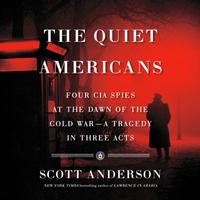 A probing history of the CIA’s evolving role from the outset of the Cold War into the 1960s, viewed through the exploits of four American spies. On the heels of Germany’s defeat in World War II, European leaders and intelligence agents were shifting focus to the Soviet Union’s dominance over Eastern Europe and threatening pursuit of influence in Asia. Under a recently sworn-in President Harry Truman, the American government was slower to gauge early. signals but eventually responded with often disastrous covert tactics. Anderson delivers a complex, massively scaled narrative, balancing prodigious research with riveting storytelling skills. He tracks the careers of four agents. In the Philippines, Edward Lansdale was instrumental in combatting the Hukbalahap uprising, lining up Ramon Magsaysay, the secretary of defense, to become president in 1954. Peter Sichel, a German Jew whose family escaped the Nazis, ran the CIA’s Berlin office for more than a decade. Former naval officer Michael Burke headed the paramilitary operations in Albania and elsewhere. Frank Wisner, the CIA’s deputy director of plans, had key roles in the Office of Policy Coordination until its full merging with the CIA in 1950. Though all four men began their careers with the strong desire to defend American freedom, the author
A probing history of the CIA’s evolving role from the outset of the Cold War into the 1960s, viewed through the exploits of four American spies. On the heels of Germany’s defeat in World War II, European leaders and intelligence agents were shifting focus to the Soviet Union’s dominance over Eastern Europe and threatening pursuit of influence in Asia. Under a recently sworn-in President Harry Truman, the American government was slower to gauge early. signals but eventually responded with often disastrous covert tactics. Anderson delivers a complex, massively scaled narrative, balancing prodigious research with riveting storytelling skills. He tracks the careers of four agents. In the Philippines, Edward Lansdale was instrumental in combatting the Hukbalahap uprising, lining up Ramon Magsaysay, the secretary of defense, to become president in 1954. Peter Sichel, a German Jew whose family escaped the Nazis, ran the CIA’s Berlin office for more than a decade. Former naval officer Michael Burke headed the paramilitary operations in Albania and elsewhere. Frank Wisner, the CIA’s deputy director of plans, had key roles in the Office of Policy Coordination until its full merging with the CIA in 1950. Though all four men began their careers with the strong desire to defend American freedom, the author
engagingly demonstrates how their efforts were undermined by politically motivated power grabs within the
U.S. government; poorly planned covert operations; and duplicitous scheming by the likes of J. Edgar Hoover
and Sen. Joseph McCarthy, who were espousing anti-communist rhetoric to advance their own careers. “By
the end of Eisenhower’s second term,” writes Anderson, “the geographical spread of governments that his
administration had undertaken to overthrow or otherwise subvert suggested an almost purposeful design, as if
it sought to alienate the citizenry of most every region and subregion of the globe.” Over the course of the
narrative, the author amply shows how the CIA was increasingly pushed to function as an instrument of
politically charged ambitions.
An engrossing history of the early days of the CIA.
© 2024 Darien Mens Association
Theme by Anders Noren — Up ↑
